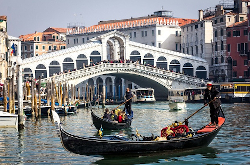과도한 관광?

Cities -- particularly in Europe -- are increasingly taking steps against tourists.
Venice, Italy, for example, is planning to bar some large passenger ships. Barcelona, Spain, has placed restrictions on apartment rentals. The problem these cities say they are dealing with is "overtourism" -- too many tourists visiting at once.
Jonathan Keates is the chairman of the Venice In Peril Fund, an aid and activist group. He said too many people are crowding the walkways and canals of Venice, interfering in what he calls a “still living city.”
Taleb Rifai is the secretary general of the United Nations World Tourism Organization (UNWTO). He spoke recently to tourism ministers at London's World Travel Market. He said the rise of slogans, such as "tourists go home" and "tourists are terrorists," was "a wake-up call."
Anger about tourism could continue to grow as more people travel every year. The UNWTO estimates tourists will take 1.8 billion trips by 2030, up from 1.2 billion in 2016.
Low-cost airline tickets are helping fuel the growth in tourism numbers, along with increasing travel from China.
Yet many places depend on tourism for jobs and wealth. Around 10 percent of the world's gross domestic product, or GDP, comes from tourism.
Taleb Rifai said that growth is not "the enemy." But, he said tourism must be made "sustainable and responsible" to help local communities.
Ecuador permits only 100,000 visitors to the Galapagos Islands each year. The Croatian city of Dubrovnik is considering permitting only 4,000 visitors daily. Visitors have flooded the Adriatic Sea town since it was used as a setting for the television series “Game of Thrones.”
Other cities are urging tourists to visit less famous parts of town. Prague, for example, has an "off the beaten track" tourist program. London is promoting neighborhoods such as Greenwich and Richmond.
Barcelona has cracked down on unofficial housing rentals and established a tourism council that includes residents, businesses, and unions.
Gloria Guevara is the president and CEO of the London-based World Travel & Tourism Council. “There is no one solution for all. Every destination is different,” she said.
Tim Fairhurst leads planning and policy at the European Tourism Association. He said businesses do not want to put their customers in places where they are treated as unwelcome. He said simple measures can make a difference, such as changing opening hours or increasing parking space.
“There are lots of ways in which we use our cities inefficiently,” he said, “We could do better.”

